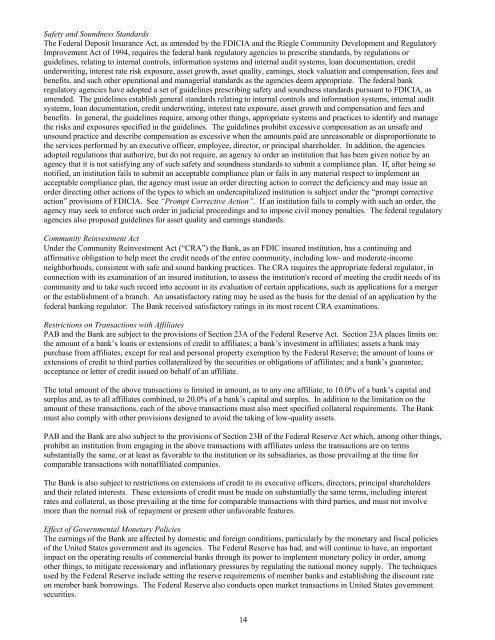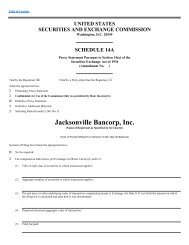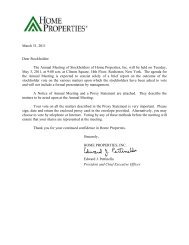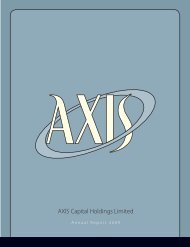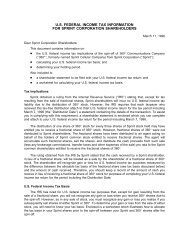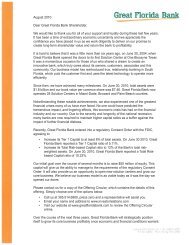pab bankshares, inc. - SNL Financial
pab bankshares, inc. - SNL Financial
pab bankshares, inc. - SNL Financial
You also want an ePaper? Increase the reach of your titles
YUMPU automatically turns print PDFs into web optimized ePapers that Google loves.
Safety and Soundness Standards<br />
The Federal Deposit Insurance Act, as amended by the FDICIA and the Riegle Community Development and Regulatory<br />
Improvement Act of 1994, requires the federal bank regulatory agencies to prescribe standards, by regulations or<br />
guidelines, relating to internal controls, information systems and internal audit systems, loan documentation, credit<br />
underwriting, interest rate risk exposure, asset growth, asset quality, earnings, stock valuation and compensation, fees and<br />
benefits, and such other operational and managerial standards as the agencies deem appropriate. The federal bank<br />
regulatory agencies have adopted a set of guidelines prescribing safety and soundness standards pursuant to FDICIA, as<br />
amended. The guidelines establish general standards relating to internal controls and information systems, internal audit<br />
systems, loan documentation, credit underwriting, interest rate exposure, asset growth and compensation and fees and<br />
benefits. In general, the guidelines require, among other things, appropriate systems and practices to identify and manage<br />
the risks and exposures specified in the guidelines. The guidelines prohibit excessive compensation as an unsafe and<br />
unsound practice and describe compensation as excessive when the amounts paid are unreasonable or disproportionate to<br />
the services performed by an executive officer, employee, director, or pr<strong>inc</strong>ipal shareholder. In addition, the agencies<br />
adopted regulations that authorize, but do not require, an agency to order an institution that has been given notice by an<br />
agency that it is not satisfying any of such safety and soundness standards to submit a compliance plan. If, after being so<br />
notified, an institution fails to submit an acceptable compliance plan or fails in any material respect to implement an<br />
acceptable compliance plan, the agency must issue an order directing action to correct the deficiency and may issue an<br />
order directing other actions of the types to which an undercapitalized institution is subject under the “prompt corrective<br />
action” provisions of FDICIA. See “Prompt Corrective Action”. If an institution fails to comply with such an order, the<br />
agency may seek to enforce such order in judicial proceedings and to impose civil money penalties. The federal regulatory<br />
agencies also proposed guidelines for asset quality and earnings standards.<br />
Community Reinvestment Act<br />
Under the Community Reinvestment Act (“CRA”) the Bank, as an FDIC insured institution, has a continuing and<br />
affirmative obligation to help meet the credit needs of the entire community, <strong>inc</strong>luding low- and moderate-<strong>inc</strong>ome<br />
neighborhoods, consistent with safe and sound banking practices. The CRA requires the appropriate federal regulator, in<br />
connection with its examination of an insured institution, to assess the institution's record of meeting the credit needs of its<br />
community and to take such record into account in its evaluation of certain applications, such as applications for a merger<br />
or the establishment of a branch. An unsatisfactory rating may be used as the basis for the denial of an application by the<br />
federal banking regulator. The Bank received satisfactory ratings in its most recent CRA examinations.<br />
Restrictions on Transactions with Affiliates<br />
PAB and the Bank are subject to the provisions of Section 23A of the Federal Reserve Act. Section 23A places limits on:<br />
the amount of a bank’s loans or extensions of credit to affiliates; a bank’s investment in affiliates; assets a bank may<br />
purchase from affiliates, except for real and personal property exemption by the Federal Reserve; the amount of loans or<br />
extensions of credit to third parties collateralized by the securities or obligations of affiliates; and a bank’s guarantee,<br />
acceptance or letter of credit issued on behalf of an affiliate.<br />
The total amount of the above transactions is limited in amount, as to any one affiliate, to 10.0% of a bank’s capital and<br />
surplus and, as to all affiliates combined, to 20.0% of a bank’s capital and surplus. In addition to the limitation on the<br />
amount of these transactions, each of the above transactions must also meet specified collateral requirements. The Bank<br />
must also comply with other provisions designed to avoid the taking of low-quality assets.<br />
PAB and the Bank are also subject to the provisions of Section 23B of the Federal Reserve Act which, among other things,<br />
prohibit an institution from engaging in the above transactions with affiliates unless the transactions are on terms<br />
substantially the same, or at least as favorable to the institution or its subsidiaries, as those prevailing at the time for<br />
comparable transactions with nonaffiliated companies.<br />
The Bank is also subject to restrictions on extensions of credit to its executive officers, directors, pr<strong>inc</strong>ipal shareholders<br />
and their related interests. These extensions of credit must be made on substantially the same terms, <strong>inc</strong>luding interest<br />
rates and collateral, as those prevailing at the time for comparable transactions with third parties, and must not involve<br />
more than the normal risk of repayment or present other unfavorable features.<br />
Effect of Governmental Monetary Policies<br />
The earnings of the Bank are affected by domestic and foreign conditions, particularly by the monetary and fiscal policies<br />
of the United States government and its agencies. The Federal Reserve has had, and will continue to have, an important<br />
impact on the operating results of commercial banks through its power to implement monetary policy in order, among<br />
other things, to mitigate recessionary and inflationary pressures by regulating the national money supply. The techniques<br />
used by the Federal Reserve <strong>inc</strong>lude setting the reserve requirements of member banks and establishing the discount rate<br />
on member bank borrowings. The Federal Reserve also conducts open market transactions in United States government<br />
securities.<br />
14


